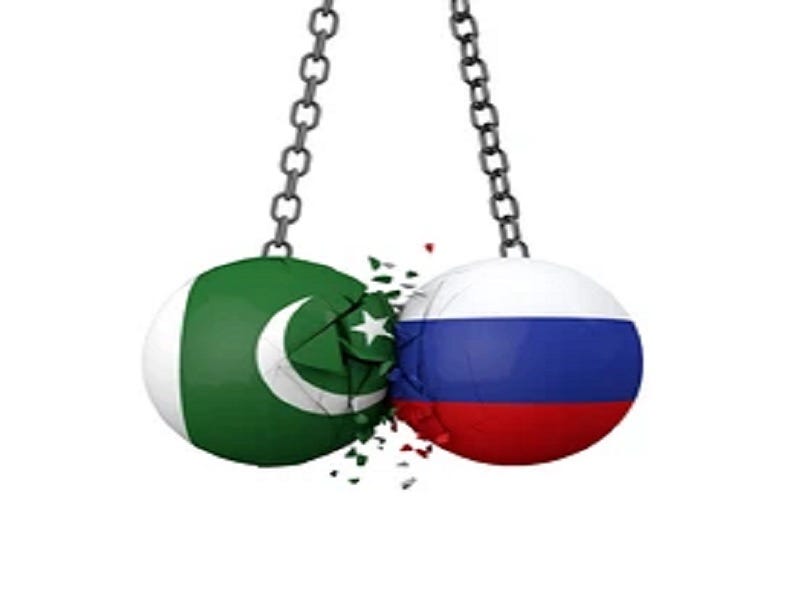Russia agreed in the middle of the last decade to comprehensively expand relations with Pakistan after taking all relevant factors into consideration, yet this would be an unexpectedly unpleasant development if true and would naturally change its strategic calculations.
Russian Ambassador to India Denis Alipov responded to a question during his latest press conference about the potential consequences of suspected Pakistani arms sales to Kiev following compelling reports about this development in August. He said that “Russia has taken serious note of reports of arms supply from Pakistan to Ukraine. If such reports are confirmed then it will have serious and negative implications for Russia-Pakistan ties.” Ambassador Alipov reacted in such a way despite President Putin and Prime Minister Sharif enjoying what appeared to be a positive meeting on the sidelines of the SCO Summit in Samarkand, albeit one in which the former arguably sent the latter a veiled message.
In my piece “Explaining Putin’s Hint That Afghanistan Will Determine The Future Of Russian-Pakistani Ties”, I drew attention to how he signaled that the comprehensive expansion of their energy and trade ties largely depends on Islamabad using its influence to stabilize the situation in that war-torn country. By “Reading Between The Lines Of SVR’s Official Response To ISIS-K’s Kabul Embassy Attack” in early September, it becomes clear that Moscow suspects that Islamabad might have at the very least sat on intelligence about that terrorist plot instead of sharing it. These concerns added a degree of informal tension to their leaders’ meeting, and now Ambassador Alipov reminded everyone of the other issue.
On the surface, “Suspected Pakistani Arms Sales To Kiev Don’t Automatically Imply Proxy War Intentions” since it can be argued that they’re just an apolitical business deal by an increasingly bankrupt country that wouldn’t turn down the chance to make a few extra bucks during these difficult times. There’s also the argument that they’re no different than actual Russian arms sales to India so there isn’t a reason for Moscow to negatively react to them when it’s been arming Delhi to the teeth for decades. That, however, isn’t necessarily true and gets at precisely why Ambassador Alipov warned that those reports “will have serious and negative implications” for bilateral relations if confirmed.
First, India and Pakistan aren’t engaged in active hostilities, unlike Russia and Ukraine. This means that Russia’s arms sales to India could still function as a form of deterrence intended to maintain the balance of power and thus promote a peaceful political solution to their well-known dispute. Pakistan’s suspected arms sales to Kiev, however, are occurring during major hostilities that actually amount to a US-led NATO proxy war on Russia. They therefore serve no deterrence purpose and directly contribute to killing Russians, which is why Ambassador Alipov warned that bilateral relations would suffer if August’s reports are true.
Second, Russia’s arms sales to India are public knowledge and aren’t carried out clandestinely unlike Pakistan’s suspected ones to Kiev via a transnational UK-led airbridge. The significance of this observation is that Pakistan still decided to comprehensively improve relations with Russia in spite of that Eurasian Great Power arming its rival to the teeth over the decades since both realized that they can mutually benefit through connectivity, energy, and other forms of cooperation. Russia, by contrast, didn’t expect Pakistan to allegedly ship arms to Kiev during the height of hostilities between those two, let alone via Moscow’s British rival. That’s why this would harm their ties if the reports are proven true.
And third, the larger context in which these reports have circulated suggests that Pakistan’s suspected arms sales to Kiev are part of a pattern of destabilizing behavior that began after the post-modern coup against former Prime Minister Khan in early April. Relations with Russia were unofficially frozen, the Taliban accused Pakistan of letting a US drone transit through its airspace to carry out an attack in Kabul, Islamabad is reported to have secretly sent arms to Kiev via a transnational UK-led airbridge, and SVR seems to suspect this South Asian state of at the very least sitting on intelligence about ISIS-K’s Kabul Embassy attack. Understandably, Russia’s approach to Pakistan might soon change accordingly.
With these reasons in mind, it’s misleading to compare actual Russian arms sales to India to Pakistan’s suspected arms sales to Kiev via a transnational UK-led airbridge. While superficially similar, they’re very different in terms of context, which is why Ambassador Alipov warned that bilateral relations will worsen if it’s proven that Pakistan did indeed secretly send such arms to Kiev like was earlier reported. After all, Russia agreed in the middle of the last decade to comprehensively expand relations with Pakistan after taking all relevant factors into consideration, yet this would be an unexpectedly unpleasant development if true and would naturally change its strategic calculations.





FUCK PUTIN FUCK PUTIN FUCK PUTIN
Pakistan's possible involvement in the NATO war can be compared to the "coalition of the willing" that George W. Bush presented to the world twenty years ago. Included in this expansive list of US allies were the Marshall Islands, Micronesia, Palau and Solomon Island (none of which had armies). If Pakistan is helping the Biden Crime Family to any extent, it can only be compared to the "protection payments" made by helpless business owners to the Mafia 90 years ago.